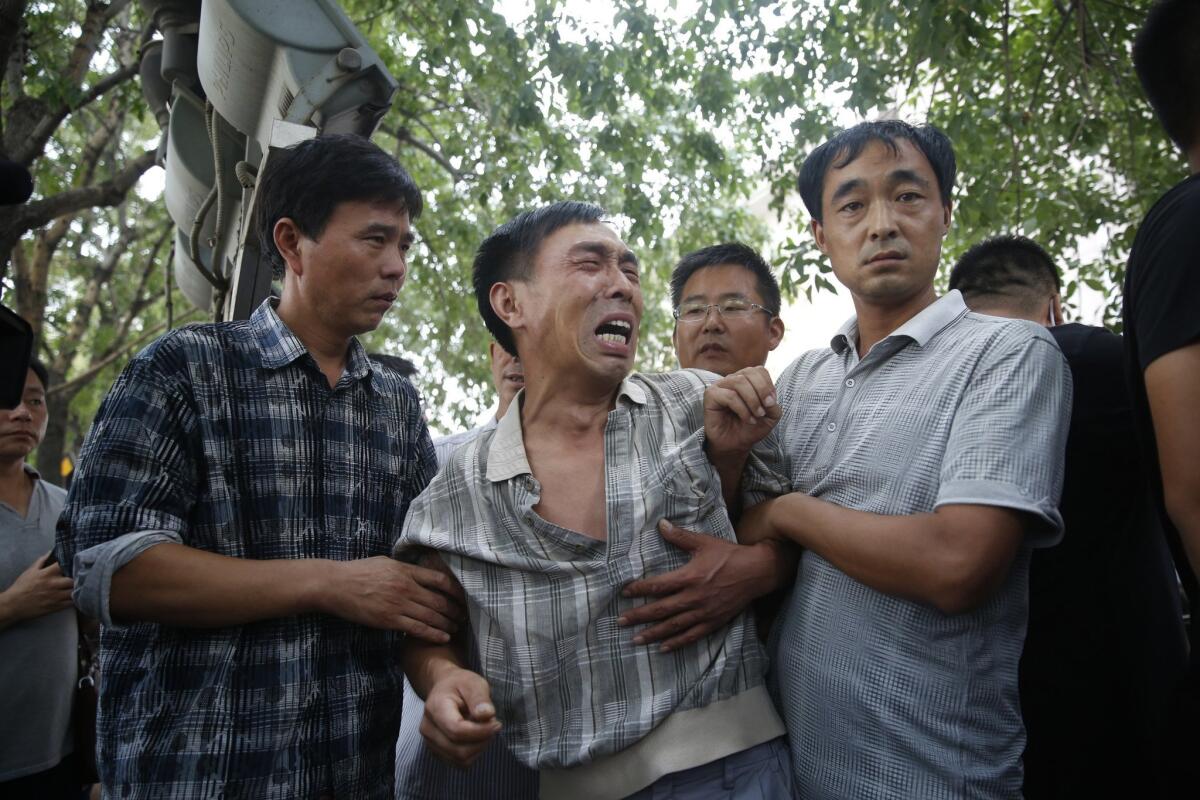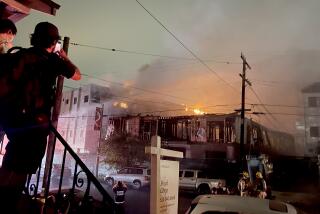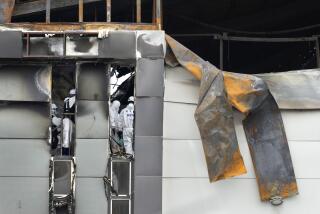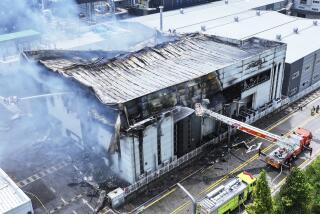The anguish of Tianjin -- homes lost, loved ones missing

The husband of a woman killed during explosions at a chemical warehouse in Tianjin, China, is pulled away as he protests outside a hotel where authorities were holding a news conference on Aug. 16.
Reporting from Tianjin, China — At about 11 p.m. Wednesday, Zhang Deyong stood by his apartment’s 22nd-story window and watched two massive fireballs ripple into the sky and then fade into an ominous mushroom cloud of smoke and debris. He felt shock waves course through him, knocking him off-balance. Then he fled, panicked, his wife and their 4-year-old daughter in tow.
Since then, the panic has not abated.
With nowhere else to go, the 35-year-old driver took his family to a makeshift refugee camp at the Tianjin Economic Development Area No. 2 Primary School, a slapdash array of cots in muggy, tile-floored classrooms. He said he doesn’t know what to do next.
His parents’ home in central China’s Hubei province is far away -- train tickets are sold out, and flights are unaffordable. On Sunday afternoon, he still wore the shorts that he wore the night of the disaster. His daughter won’t stop crying. At night, his family is swarmed by clouds of mosquitoes, making sleep impossible.
“I can’t go home,” he said, choking back tears. “I can’t go home. I can’t go home.”
Tianjin, a northeastern Chinese city of 14 million only a short drive from Beijing, is still reeling days after an inferno at a warehouse containing hazardous chemicals precipitated two massive explosions, killing at least 112 people and hospitalizing more than 700. The blasts burned out buildings, incinerated cars and trucks and shattered windows miles away.
At least 6,000 people lost their homes, at least temporarily, and for many of them, the nightmare is just beginning. Several told The Times that officials have given them no information on relocation, compensation or even the safety of returning for their belongings.
A homeowner at Tianjin’s Vanke Harbor City development said she watched the blasts with her husband from their 27th-floor window, then fled in her underwear, carrying their pet dog.
“We checked into a hotel with our own credit cards,” said the woman, who gave her name as Ms. Shen. “No one from the government offered us any help. They did have a relocation plan for the victims, but it was just moving them to a playground in a school. Anybody with any money, or friends, or family, would never want to stay there.
“[My husband and I] got married in February and just moved into our new apartment in March -- we still haven’t even had a proper wedding yet,” she continued. “And our new home, which we bought for our marriage, has already been destroyed. We really don’t know what to do.”
Authorities have sought to quell public anxiety: Premier Li Keqiang traveled to the blast site on Sunday afternoon to lend solace to firefighters, hospitalized victims and refugees. Local officials have offered assurances that the area’s air is safe to breathe, despite the black smoke that still rises from the site of the blasts.
At least 95 people are still missing, most of them firefighters, and many residents are concerned that the death toll will continue to rise. Outside the primary school, which volunteers say is housing more than 500 refugees, families have plastered their phone numbers and the names of missing loved ones to a long row of white poster boards, desperately seeking scraps of information.
“So far I have received no information about my father,” said Sun Yu, 31, whose 56-year-old father, firefighter Sun Weiqi, has not been heard from since Wednesday night, when he was dispatched to help extinguish the inferno. “Nothing from the authorities in charge of the rescue efforts. I don’t even have access to news conferences.”
The explosion occurred in the Binhai New Area, an 800-square-mile district that includes one of the country’s busiest ports. The company that owned the facility, Ruihai International Logistics, has not issued a statement on the cause of the blast. Yet state-run media have reported that the firm’s warehouses contained sodium cyanide, a compound that produces toxic gas, and calcium carbide, which reacts violently to water. Emergency responders are attempting to clear the site of remaining chemicals, including an estimated 100 tons of sodium cyanide, before it rains.
------------
FOR THE RECORD
Aug. 17, 8:02 p.m.: An earlier version of this article said that state-run media had reported that Ruihai International Logistics’ warehouses contained sodium cyanide, a compound that produces toxic gas and reacts violently to water. Sodium cyanide produces toxic gas, but it was another chemical found on the site -- calcium carbide -- that reacts violently to water.
------------
On Sunday morning, owners of property at Qihang Jiayuan, a high-end residential complex near the site of the blast, gathered in protest at a hotel in the nearby Tianjin Economic Development Area. They unfurled a banner reading “A plea from Qihang Jiayuan refugees.”
They distributed a list of demands: that the authorities dispatch a team to establish a direct line of communication with property owners, compensate their losses by purchasing their property back, and provide well-defined resettlement plans, among other measures. They also urged the authorities to conduct an investigation into why the chemical storage facility was allowed to operate within a few hundred yards of housing developments and schools.
In the afternoon, employees at companies based in an industrial park near the blast zone anxiously loaded materials from their damaged offices into moving trucks. Nearby, residents of less-damaged buildings waited for repair workers to replace their shattered plate-glass windows.
Steve Ra, a 37-year-old American from Orange County who lived about 2 1/2 miles from the blasts, said his employer, an English training school for adults, suspended classes and relocated him into a temporary apartment far from the disaster zone. He said he did not know when school would resume.
Amjad Rashid, Ra’s 40-year-old colleague and roommate at the temporary residence, said he lived even closer to the blast site than Ra. Although the windows in his apartment faced away from the site, he said, the force of the explosion knocked his door off its hinges and jarred him awake.
“I’ve never seen anything like that before,” he said. “I came toward the door, and everybody was heading toward the staircase. My neighbors were injured. Especially when we went outside. Glass on the feet. Injuries on the face. ... Often they had a window right in front of the bed. It just shattered onto their faces.”
Rashid added that although he had only arrived in China about two months ago, he planned to move back to his home in Birmingham, England, within days. “I don’t feel comfortable about the experience,” he said. “I’m not happy -- I was thinking maybe I should go somewhere else. I think I need a reset.”
Tommy Yang and Nicole Liu in the Times’ Beijing bureau contributed to this report.
Follow @JulieMakLAT for news from China
More to Read
Sign up for Essential California
The most important California stories and recommendations in your inbox every morning.
You may occasionally receive promotional content from the Los Angeles Times.











